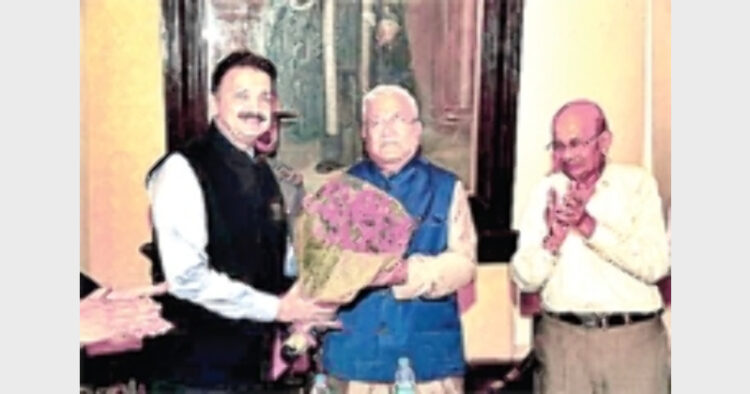Shri Padmanabh Acharya, Governor of Nagaland and Assam, has been mobilising doctors, teachers and NGOs to visit the North-East in a bid to become a bridge between the mainstream and the N-E region. “Acharya is truly a People’s Governor,” said Dijang Kamson, who hails from Dimapur and has been in Mumbai for his advanced studies. Kamson was speaking at a function organised by Mumbai University Vice-Chancellor Dr Sanjay Deshmukh for inauguration of the Rani Ma Gaidinliu Academy for Bharateeya Tribal Dialects. The inaugural ceremony took place at Mumbai University.
The inauguration has a historical backdrop since the 8th Schedule of the Constitution of Bharat, while recognising “official” Bharateeya languages, has made no provision to protect minor languages, especially the tribal languages in general and of the North-East in particular. According to global trends, such minor languages lose their identity over a period of time since the dominant language is used more and more. This was very much realised by the British who sent their missionaries to this neglected region, that is North-East Bharat.
Hoping that the academy would be active soon Shri Acharya said , we must accept our failure as a society for ignoring the North-East. Shri Achary’s efforts to remove this lacuna, at least to some extent, have now been materialized in the form of the Academy. Shri Acharya said that instead of calling N-E “Seven Sisters” (the seven states from the North-East), he has coined a new term for them. Accordingly, he calls the seven states as NAMASTE states. The term is defined by picking the first letter of the states, as :– Nagaland, Arunachal Pradesh, Manipur, Meghalaya, Assam, Sikkim, Tripura and E for East.
Shri Acharya said there were an estimated 300 dialects in the North-East. But he found that aithough most universities in Bharat have a Department of Foreign Languages, there is no such facility to teach and learn the North-East dialects. Therefore, the initiative by Mumbai University is most laudatory. Coming down heavily on the prevalent syllabi in Bharateeya universities, Shri Acharya felt that they had been imparting education but not knowledge. Any education, he observed, must be useful in later life. Highlighting the point, he said there is no facility to teach tea plantation or use of solar energy in Assam. There is no connect between the knowledge that could be used and what is taught. Universities needs to become centres of knowledge and skills, he felt.
Ever since he took over as Governor of Nagaland, Shri Acharya has unleashed the initiative to invite volunteers from the mainland to the North-East. Under the programme ‘People-to-people Interaction for National Integration for Cultural Exchange’, takes place.
Shri Acharya was among the very first few Swayamsevaks who began to work in North-East. His association with the region exceeds half a century. Prime Minister Shri Narendra Modi is been complimented all across the region for picking up a Swayamsevak like Shri Acharya to become Governor of Nagaland. A veteran of the Akhil Bharatiya Vidyarthi Parishad, Shri Acharya is one of the silent workers of the Sangh Parivar who has devoted his life for the cause of the nation.
Welcoming the Governor, Dr Deshmukh said exchange of students between the North-East and the mainland would be an effective way to achieve national integration. Dr Sanjay Deshmukh said this Academy will aim at teaching North-East dialects in Mumbai. The proposed Academy will plan to conduct a six-month certificate course and a one-year PG diploma course, after completion of which, the students will spend six days in ‘Angami’ area in Nagaland for internship. Subject experts from Mumbai will guide the students. The Project will comprise teaching elementary levels for speaking and reading of one of the tribal dialects of North-East Bharat.
A highlight of the inaugural function was the touching speech by a student of Mumbai University, Dijang Kamson, who has come to Mumbai from Dimapur. He said language is a strong force to unite people. Dijang began his speech by saying in Marathi “Namaskar, mee Dijang Kamson” and received thunderous applause. The Academy which is called as Rani Ma Gaidinliu Academy for Indian Tribal Dialects is named after Rani Gaidinliu , who was a Naga spiritual and political leader. Dilip Chaware













Comments